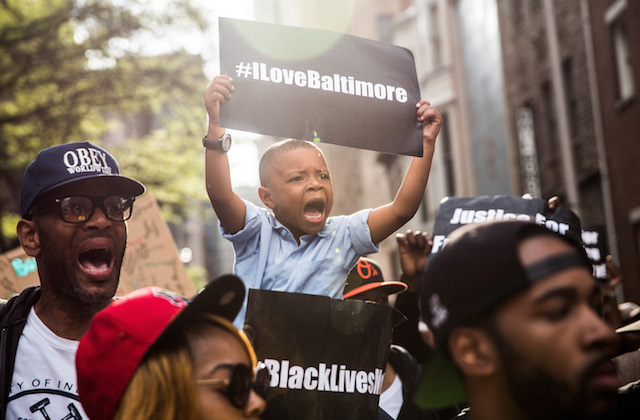The U.S. Department of Justice (DOJ) and Baltimore city government announced their agreement on a consent decree for substantial Baltimore Police Department (BDP) reforms yesterday (January 11).
The 227-page decree, published by The Baltimore Sun today, arrives a year and eight months after the DOJ started investigating the BPD for its alleged civil rights violations. That investigation was prompted by massive outrage and unrest over 25-year-old Freddie Gray‘s 2015 death in police custody. The DOJ issued a report in August that concluded that the BPD systematically and disproportionately violates the constitutional rights of Black Baltimore residents.
The reforms include:
- A Community Oversight Task Force, consisting of five mayor-appointed members, that will recommend reforms for the city’s current Civilian Review Board regarding how it handles citizen complaints against police
- A Crisis Intervention Team program that will train select officers to respond to distress calls for individuals with behavioral health issues
- Revised use of force provisions, including the prohibition of chokeholds "unless deadly force is authorized and no reasonable force alternative exists that is within BPD policy"
- Arrest data tracking aimed at analyzing and correcting bias
- Adding video cameras to all suspect transport vans
- A new recruitment plan to develop "a quality work force that reflects the diversity of the Baltimore community"
"The agreement is robust and comprehensive," said Attorney General Loretta Lynch at a press conference with Baltimore mayor Catherine Pugh and police commissioner Kevin Davis today (January 12). "It includes a range of reforms to achieve our three main goals: to ensure effective and constitutional policing, to restore community’s trust in law enforcement and to advance public and officer safety. It will help BPD gain the cooperation it needs from residents to fight and prevent crime. Most importantly, it reflects significant input from the people of Baltimore."
The Sun reported today that the city’s Board of Estimates, which includes the mayor and other senior city officials tasked with executing the city’s fiscal policy, unanimously approved the consent decree. Although the Board did not outline prospective costs, The Sun did report that the reforms are "expected to cost the city millions." The agreement now awaits further public input and a federal judge’s approval. "For me, this was not about cost," Pugh said at the press conference. "This was about fairness and understanding."
"Today is a revolution in policing in Baltimore," Gray family attorney William Murphy said in a statement to Baltimore Magazine. "It will be remembered. It is a sea change."
Police Commissioner Davis called the decree "a path forward" during today’s press conference. "I have no doubt we will emerge from this as better crime fighters," he said. "And with better relations with the community."
Not all law enforcement representatives were happy with the outcome. Gene Ryan, president of the Baltimore City Fraternal Order of Police (FOP) union, issued a statement today lamenting that the FOP was not included in decree negotiations, "despite continued assurances by representatives of the Department of Justice that our organization would be included." Ryan wrote that the FOP had no comment because he had not yet reviewed the decree, but that "a response will be forthcoming at the appropriate time."
